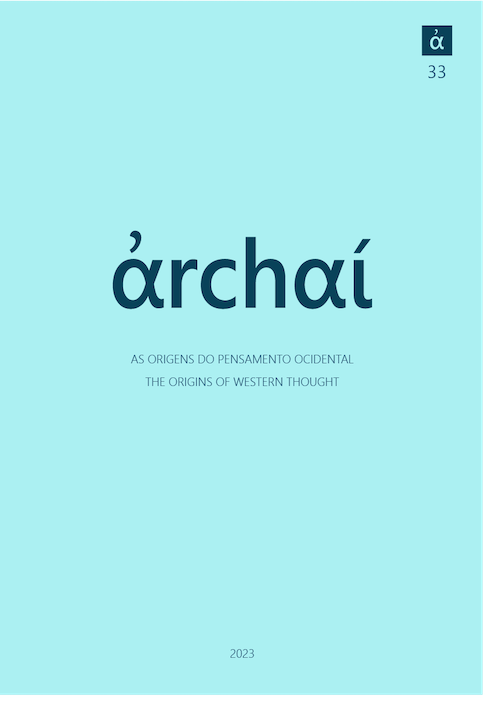Thought, Memory, and Being in Plato’s Sophist
DOI:
https://doi.org/10.14195/1984-249X_33_23Keywords:
Plato, thinking, lógos, memory, recollectionAbstract
Thinking as described in Plato’s Sophist undergoes two basic changes: it progresses by shifting from one to many and it regresses by shifting from many to one. The change from one to many is generative; the change from many to one is reductive. These opposing changes provide a tension for thinking, and like Heraclitus’ bow string, this tension gives thinking its efficacy. Thinking would wander and accumulate endlessly unless it regresses from many to one. Yet, thinking would stagnate if it could not progress from one to many. Both changes are essential characteristics of thinking, and both rest on memory. Memory constitutes the foundation of thought.
Downloads
References
AMBUEL, D. (2007). Image and Paradigm in Plato’s Sophist Las Vegas, Parmenides Publishing.
BEEKES, R. (2010). Etymological Dictionary of Greek Leiden, Brill.
COOPER, J. (ed.) (1997). Plato. Complete Works Cambridge, Hackett Publishing Company.
CORNFORD, F. M. (1935). Plato’s Theory of Knowledge New York, Harcourt, Brace and Company.
FOWLER, H. N. (trans.) (1921) Plato. Plato in Twelve Volumes, Vol. 12 Cambridge, Harvard University Press
GUTHRIE, W. K. C. (1978). A History of Greek Philosophy: Vol. V: The Later Plato and the Academy Cambridge, Cambridge University Press.
IONESCU, C. (2013). Dialectic in Plato’s Sophist: Division and the Communion of Kinds. Arethusa 46, n. 1, p. 41-64.
KAHN, C. H. (1981). The Art and Thought of Heraclitus: An Edition of the Fragments with Translation and Commentary Cambridge, Cambridge University Press .
KAHN, C. H. (2007). Why Is the Sophist a Sequel to the Theaetetus? Phronesis 52, n. 1, p. 33-57.
LIDDELL, H. G.; SCOTT, R.; JONES, H. S. (1968). A Greek-English Lexicon Oxford, Clarendon Press.
MINAR, E. L. Jr. (1939). The Logos of Heraclitus. Classical Philology 34, n. 4, p. 323-341.
MOST, G. W. (ed. and trans.) (2006). Hesiod. Theogony, Works and Days, Testimonia Cambridge, Mass., Harvard University Press.
PENDER, E. E. (1999). Plato’s Moving ‘Logos’. Proceedings of the Cambridge Philological Society 45, p. 75-107.
Downloads
Published
How to Cite
Issue
Section
License
Copyright (c) 2023 Anthony Pasqualoni

This work is licensed under a Creative Commons Attribution 4.0 International License.
Given the public access policy of the journal, the use of the published texts is free, with the obligation of recognizing the original authorship and the first publication in this journal. The authors of the published contributions are entirely and exclusively responsible for their contents.
1. The authors authorize the publication of the article in this journal.
2. The authors guarantee that the contribution is original, and take full responsibility for its content in case of impugnation by third parties.
3. The authors guarantee that the contribution is not under evaluation in another journal.
4. The authors keep the copyright and convey to the journal the right of first publication, the work being licensed under a Creative Commons Attribution License-BY.
5. The authors are allowed and stimulated to publicize and distribute their work on-line after the publication in the journal.
6. The authors of the approved works authorize the journal to distribute their content, after publication, for reproduction in content indexes, virtual libraries and similars.
7. The editors reserve the right to make adjustments to the text and to adequate the article to the editorial rules of the journal.



